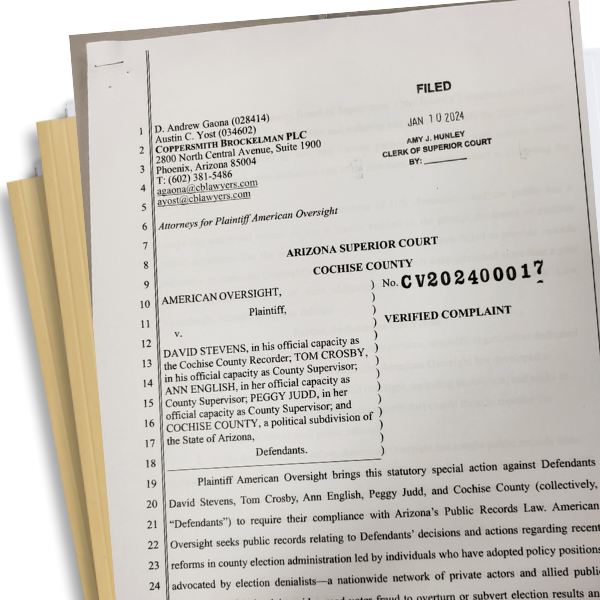
American Oversight Provides Court Further Proof Cochise County Supervisors Used Personal Email and Texts for Official Business
New evidence from American Oversight bolsters the watchdog’s request that the court order Supervisors Tom Crosby and Peggy Judd — who in 2022 refused to certify the election results by the state deadline — to answer questions in its public records lawsuit.

On Monday, nonpartisan watchdog organization American Oversight provided new evidence to Judge Steven C. Moss of Mohave County Superior Court that Cochise County Supervisor Tom Crosby used his personal cell phone and email account for official business — further supporting the motion to compel Crosby’s and fellow supervisor Peggy Judd’s deposition testimony in the organization’s lawsuit seeking public records related to election administration.
The supervisors had refused to answer any deposition questions, citing the Fifth Amendment privilege against self-incrimination. Last month, American Oversight asked the court to order Crosby and Judd to answer specific questions about whether they had searched their personal devices and accounts for records responsive to requests, because no records from those devices and accounts had been produced.
Statement from American Oversight interim Executive Director Chioma Chukwu:
“This new evidence exposes the depth of Crosby’s misconduct, showing he deliberately used personal email and text messages to conduct official election business — yet not a single message has been produced in response to our public records requests or in this lawsuit. The public deserves the truth, not more stonewalling. It’s past time for Crosby and Judd to stop hiding behind flimsy Fifth Amendment excuses. The court should order them to answer questions under oath, or assume their silence is as telling as the answers they’re trying to avoid.”
New Corroborating Evidence
- On Sept. 6, the defendants finally provided records from Cochise County Recorder David W. Stevens’ cell phone and personal email accounts, which had been promised weeks earlier.
- The records, which were missing from previous document productions, include emails from Crosby’s personal email account, responsive to American Oversight’s Nov. 4, 2022, request regarding the supervisors’ vote to order a hand count of ballots.
- The newly released records also include text messages between Crosby and Stevens discussing county election business, exchanged on their personal cell phones. No records from those personal devices had been produced.
- The records indicate that neither Crosby, Judd, nor anyone else searched the supervisors’ devices and accounts in response to public records requests or during litigation. A forensic specialist’s search of Stevens’ devices provided independent corroborating evidence that Crosby’s personal accounts were never searched.
- American Oversight’s Sept. 10 Notice of New Evidence submitted samples of this correspondence and asked the court to compel Crosby and Judd to testify or to apply an unfavorable inference.
Read the notice of new evidence here.
Read the motion to compel here.
Read the reply in support of motion to compel here.
Background on American Oversight’s Lawsuit in Cochise County
Crosby and Judd gained national attention in 2022 after refusing to certify the county’s election results, falsely claiming the tabulators were uncertified. Arizona’s attorney general sued, and a court ordered them to certify. Both were later indicted for felony conspiracy and election interference.
American Oversight submitted public records requests in November 2022 related to election administration changes and the refusal to certify, but after receiving no records, sued to compel the release of the records in January 2024. A deposition revealed that County Recorder David Stevens had deleted relevant records, leading to a forensic search.
In August, Crosby and Judd invoked the Fifth Amendment during depositions, refusing to answer key questions. American Oversight’s motion argues the supervisors cannot make blanket objections in a civil case and asks the court to compel them to confirm whether they searched their personal accounts for public records, or to infer they did not.